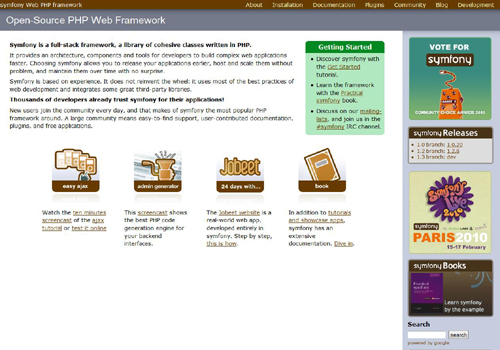What is a PHP Framework?
PHP is the world’s most popular scripting language for many different reasons – flexibility, ease-of-use, among others – but often times coding in PHP, or any language for that matter, can get rather monotonous and repetitive. That’s where a PHP framework can help.
PHP frameworks streamline the the development of web applications written in PHP by providing a basic structure for which to build the web applications. In other words, PHP frameworks help to promote rapid application development (RAD), which saves you time, helps build more stable applications, and reduces the amount of repetitive coding for developers. Frameworks can also help beginners to build more stable apps by ensuring proper database interaction and coding on the presentation layer. This allows you to spend more time creating the actual web application, instead of spending time writing repetitive code.
The general idea behind the workings of a PHP framework is referred to as Model View Controller (MVC). MVC is an architectural pattern in programming that isolates business logic from the UI, allowing one to be modified separately from the other (also known as separation of concerns). With MVC, Model refers to data, View refers to the presentation layer, and Controller to the application or business logic. Basically, MVC breaks up the development process of an application, so you can work on individual elements while others are unaffected. Essentially, this makes coding in PHP faster and less complicated.
Why Should we use a PHP Framework?
Developers should utilize PHP frameworks for various reasons, but the number one reason is for speeding up the development process. Reusing code across similar projects will save the developer a substantial amount of time and effort. A framework offers pre-built modules for performing tedious coding tasks, so the developer can spend their time on developing the actual application rather than re-building the foundation with each and every project.
Stability is another big reason developers are utilizing frameworks. While simplicity is one of PHP’s greatest assets, and the reason many people prefer to use this scripting language, it can also be one of its biggest downfalls. It’s fairly easy, especially for beginners, to write bad code and not even realize it. With PHP the application will often times still work, but unknowingly you may have opened up a large security hole in your coding that may be susceptible to attacks. It’s important to remember that PHP is a very forgiving language, so it’s even more important to make sure to tie up any loose ends in your coding – even if the application seems to be working properly.
Finally, the availability of PHP frameworks is extensive, and there are many different frameworks to choose from. You can even create your own, although many developers elect to choose from any of the most well-known frameworks due to their popularity, large support teams, and their forums/communities that allow you to interact with other developers who utilize the same framework. As a side note, you should always examine your project to first decide if you should even use a framework or not. Some questions you should ask yourself are: Will it save you, and anyone else who may use it, time and effort? Will the app perform better? Will it improve stability? If you can answer yes to any of these questions, a PHP framework may be the right answer for that particular project.
When to use a PHP Framework?
This is a common question amongst experienced and beginner developers alike, and there’s really no direct answer to the question. For many beginners, a framework will offer greater simplicity as well stability, so it may be a good idea to use PHP frameworks whenever possible. It will help reduce or eliminate bad coding and speed up the build process.
On the other hand, many experienced PHP programmers see frameworks as tools for “weak” programmers that don’t understand how to write good, clean code. Whether this is true or not is up for debate, but the fact of the matter is that PHP frameworks are a tool that can be used to save time and tighten up one’s coding.
When working on a project with tight deadlines, utilizing a PHP framework is a huge benefit that can greatly speed up the coding process. So if you’re in a time crunch, PHP frameworks can be very beneficial to you. Another instance when PHP frameworks should be a consideration is when you’re working on projects with substantial amounts of monotonous coding, because it will help make the job much less tedious.
What to Look for in a PHP Framework?
There’s plenty of options available to anyone who may be searching for PHP frameworks, and there’s even the option of creating your own, although that’s only recommended for PHP experts. When searching for the the PHP framework best suited for your needs, it’s important to keep in mind who will be using and/or modifying your applications from top to bottom. If there are many people who will be using the application, it may be best use a popular PHP framework that many developers are familiar with. On the other hand, if you wish to build web applications for your own personal use, you are better off choosing any PHP framework that you’re comfortable with – whether it’s popular amongst the developer community or not.
Various factors to search for in a PHP framework include: easy of use, rapid development/performance, popularity amongst other developers, strong features, and support/forums. It’s recommended to try out several PHP frameworks when you’re first starting out in order to find one that suits your needs the best. All frameworks are slightly different and have varying strengths and weaknesses, for instance Zend Framework has been around since V3 and is full of features plus has an extensive support system in place since it has been around for so long. On the contrary, CakePHP is another PHP framework which is younger than Zend Framework and has slightly less of a support system in place (although support for this framework is growing rapidly), but is much more user-friendly and easy to use.
As you can see, each type of PHP framework has its own advantages, so it’s best to use a bit of trial and error to figure out which one will work the best for your needs. Another excellent way of choosing a framework is to consult your colleagues in the development community to see which ones they prefer. Those who have actually used a specific framework will be able to inform you of the ease-of-use, features, support availability, scope of the community surrounding the framework, and possible shortfalls.
Most Common Mistakes When Using a PHP Framework
Mistakes are possible in any type of programming, but PHP frameworks help to limit these mistakes greatly by providing good quality code that is tried and true from the start of the development process. Repetitive coding seems to promote mistakes now and then, and frameworks all but eliminate that problem.
That being said, there are still things to be careful of when utilizing any PHP framework. For instance, unless you are an expert in PHP programming, you should always opt for using a popular framework with plenty of support and an active user base (see below for examples of popular PHP frameworks). There are many frameworks out there that have little or no support, and/or they were created by individuals with limited knowledge of PHP. These types of frameworks can cause your applications to not function properly, and worse case scenario, could cause catastrophic security issues with your website.
Another somewhat common mistake is not ensuring your database and web server is compatible with the particular framework. For example, Seagull PHP Framework recommends the following configuration:
- PHP: PHP 4.3.0 is the minimum, later versions work fine, as do versions PHP 5.1.1 and above. Avoid anything in the 5.0.x series
- MySQL: MySQL 4.0.x, 4.1.x and 5.0.x are all supported. You can also use 3.23.x.
- Apache: Seagull works fine with 1.3.x and 2.x series of Apache
If you don’t meet these requirements, you won’t be observing the best performance possible from your chosen framework. Even if you are an expert in PHP, you should always go over the documentation of the framework to confirm compatibility before trying it out.
Similar to the previously mentioned common mistake, not following the recommended installation process of your PHP framework can also give you some headaches. Take Seagull as an example again – the Seagull wiki has a detailed rundown of the framework’s installation process that has several key steps that are sometimes easily overlooked by careless or unsuspecting developers. The key is to take your time setting up the framework and follow the installation instructions to the “T” – The time you’ll save actually developing applications later will more than make up for the few extra minutes spent installing the framework correctly the first time.
What are the Best PHP Frameworks Available?
Within the past few years as PHP has evolved as the scripting language of choice by most developers, there have been an explosion of PHP frameworks to hit the scene. There is a great debate about what the best PHP frameworks are, because the simple fact is that not every framework is built for everyone. Here’s a quick rundown of five of the best and most popular choices right now:
The Zend Framework

The Zend Framework has a massive following amongst the development community and is focused on web 2.0 style applications. Because of their massive following, extensive support and active user base, Zend is referred to as “The PHP Company”. Zend is one of, if not, the most popular PHP frameworks available today. It has robust features that are built for corporate-level development, and it requires an extensive knowledge of PHP.
CakePHP

CakePHP is a great choice for beginners to advanced PHP developers. It’s based on the same principles that Ruby on Rails is designed around, and it’s heavily focused on rapid development – making it a great framework to be used for rapid application development. Its rapidly growing support system, simplicity, and scalability make CakePHP one of the most popular PHP frameworks available today.
Symfony

Symfony is aimed more at advanced developers who’s main objective is to create enterprise-level applications – most notably Askeet and Yahoo! Bookmarks. This open source PHP framework is full of features and can do it all, but it’s main downfall is that it is a bit slower than other frameworks.
Codelgniter

Codelgniter is well-known for its ease-of-use, performance and speed. Unlike Symfony, this PHP framework is ideal for shared hosting accounts or for when you want a framework with a small footprint. It offers simple solutions, and has an extensive library of video tutorials, forums, a user guide and wiki available for support. Beginners should consider using Codelgniter.
Seagull

Seagull is a well-established PHP framework used for building web, command line and GUI apps. It is an extremely easy to use framework that is ideal for beginners to advanced coders. For beginners, Seagull features a library of sample applications that can be customized to fit your needs, and for experts, Seagull offers a host of options – including best practices, standards, and modular codebase – for building web applications quickly and easily. Seagull has an active developer community and plenty of support documentation in place as well.
Summary
PHP frameworks are a great way for developers of all skill levels to reduce the need for repetitive coding, speed up the development process, and to ensure proper coding when creating web applications. This not only speeds up the development of rich applications, but it also tightens up PHP security by reducing the risk of security holes in your coding.
While some expert PHP coders do not feel the need to use frameworks to develop web apps, they can still be an advantage in situations where rapid development is necessary, such as under tight deadlines. And for beginner to intermediate developers, frameworks can enhance the PHP learning process while promoting good coding practices and reducing bad coding, which is common in PHP due to its “forgiving” nature.
There are many PHP frameworks available today, and thus developers are sure to find a framework that fits there needs in terms of features, support, speed, scalability and more. Some of the top PHP frameworks used by developers today include: The Zend Framework, CakePHP, Symfony, Codelgniter, and Seagull.
Author: Joel Reyes
Joel Reyes Has been designing and coding web sites for several years, this has lead him to be the creative mind behind Looney Designer a design resource and portfolio site that revolves around web and graphic design.
Photo by Christina Morillo on Pexels






































































Send Comment:
226 Comments:
More than a year ago
Perfect Blog!! thanks to google for landing me here got every information i needed on PHP frameworks.
as a PHP developer i know one thing PHP is versatile: One of the major benefits of PHP is that it is platform independent, meaning it can be used on Mac OS, Windows, Linux and supports most web browsers. It also supports all the major web servers, making it easy to deploy on different systems and platforms at minimal additional cost.
More than a year ago
It has more number of comments than the actual blog post. I was expecting that I will get more in-depth information about framework, its core Services, how they communicate, and all that. But okay. I will study and will come back later. Will write post in detail
More than a year ago
PHP Source of MVC blog sample created using no framework to explain how MVC works:
More than a year ago
Thank you for the great article.
My company has a strict server Content Security Policy that includes script-src 'self' and style-src 'self'. This means inline Javascript and inline styling (CSS) is not allowed. All Javascript and CSS must be in external files (.js and .css).
Is this a problem for the frameworks listed here? If so, which frameworks support the development of PHP projects that do not produce inline scripts or styling in the generated code?
Thank you
More than a year ago
Thanks for the well-detailed article on PHP, you have giving high clarity about this framework
More than a year ago
it is a very good description but example with code
thanks
More than a year ago
Yes, these are the best and top PHP frameworks.
More than a year ago
Your article Awesome Thanks for this information, very informative as well as Modern.
More than a year ago
We are planning to develop auction like portal, can anyone suggest PHP framework, which can easily be tweaked to help us get going.
More than a year ago
cakePHP sucks. Why? Their own blog tutorial - ambiguously written - results invariably in error messages:
Error: PostsController could not be found.
Error: Create the class PostsController below in file: appcontrollersPostsController.php
If those idiots cannot write out a simple "hello world" tutorial ... one wonders what else they punted on.
PHP is an old, old friend. codeigniter is not, but at least it works out of the box and is documented by humans rather than imbeciles.
More than a year ago
I better use CodeIgniter because simple and fast .. not difficulty like zend framwork
More than a year ago
WORDPRESS is the best........
More than a year ago
I think Zend is not the best framework. I really hate when a project comes to my desk and it's built with Zend, the way it handles relationships and models is sad, same as the Kohana Framework (i'd burn it if i could).
The only ones frameworks that really worth, are Yii and CakePHP
More than a year ago
Hi good article. IS their any way to make websites in php, I mean I have very low knowledge about it but I am good in asp .net, can I use same logic in php ?
Help appreciated.
More than a year ago
Well written article. Apple.com uses Code Ignitor. PHP Frameworks are for web applications mainly. If you are looking for something with similar features but is mainly for front-end site building then try MODX which is really a CMS but very powerful in what it can run.
More than a year ago
+1 Yii.
Yii is very comparative frameworks to other.
It has many feetures.
More than a year ago
im using CI right now. for beginner like me in PHP .. i found CI is the best first step to learn php framework.
More than a year ago
So many replies .. Confusing !!! Where the hell is the author ? By The Way, I concluded YII to be the best..But try learning CakePHP and CodeIgniter as well..
More than a year ago
Sorry for the typo "change" s/b "chance".
PS: I have been using PHP for over 10+ years and currently have system w/o frameworks using PHP version 5.3.+.
So when I say commercial PHP I mean writing at a professional level for a commercial grade development...
More than a year ago
Which Drupal framework is the most popular.
Microsoft WebMatrix offers a few - so that is the difference or most popular?
I have a change to work with Drual but don't know the best commercial version?
More than a year ago
CI, is still my fav. Haven't tried Yii yet.
Should I try it?
How was your experience.?
More than a year ago
Thanks for the great info I have learnt alot from this article.
More than a year ago
In terms of performance, I guess DooPhp would excel the rest. They have done some benchmark tests to prove it. Anyone has used DooPhp? any thoughts?
Using framework is good, but depending on your requirements, I guess building your own framework by combining all the good aspects of other frameworks would be the best choice.
More than a year ago
dear as i know codeignighter is the basic and easy to use framework and zend is more complex than it.
CI has good documentation with it.
More than a year ago
thank very much for the knowledge of frame work which has really helped me, cos i was finding it difficult to code in php. I think i will stick to codeigniter for a start.